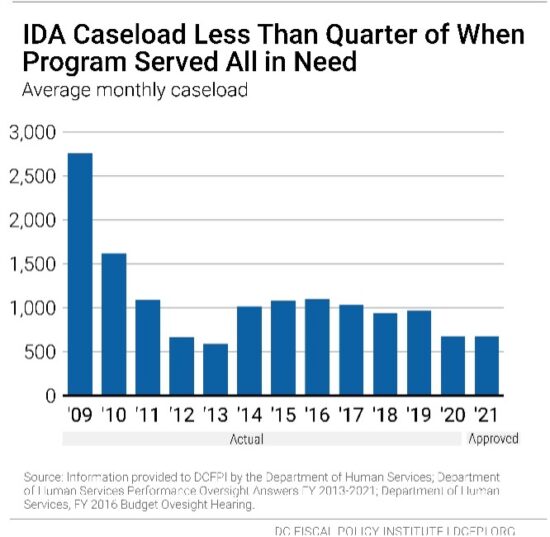
This blog post is part of a series on DCFPI’s Fiscal Year 2022 Budget Priorities. Read all of our related resources in our Fiscal Year 2022 Budget Toolkit, here.
The District of Columbia is at an important crossroads as we approach the release of the Mayor’s proposed Fiscal Year (FY) 2022 budget. The coronavirus pandemic continues to devastate our public health and key sectors of our economy, with Black and brown residents bearing the brunt of this hardship. As we move to vaccinate residents and hopefully emerge from the pandemic stronger, our leaders must address the needs of thousands of residents who have fallen behind on bills, need stable health insurance as well as physical and mental health care. The Mayor and DC Council should take the opportunity to invest in critical safety net programs—that is, income and health supports—that will help our city recover as soon as possible.
Invest in funds to support excluded workers. The economic downturn caused unprecedented job losses in the District and across the nation. It has particularly hit our Black, Latinx, and immigrant neighbors the hardest—those who faced elevated levels of unemployment and lacked good job opportunities long before the pandemic due to structural racism. But unfortunately, federal policymakers excluded certain residents—including those who are undocumented or otherwise in the informal cash economy—from federal relief efforts that provide vital cash assistance to help with bills and basic needs. The District stepped up and approved cash grants to help them pay for basic needs, totaling $5 million in FY 2020 for undocumented workers and $9 million in FY 2021 for excluded workers. Still, the total funding of $14 million for excluded workers—a one-time payment of $1,000 per person—is not enough to meet ongoing needs during this prolonged crisis nor is it enough to serve the roughly 30,000 excluded workers in the District.
We must continue to support these workers who lost their jobs or work hours and are excluded from traditional or pandemic unemployment benefits programs through direct cash assistance. The FY 2022 budget should provide another round of assistance for excluded workers who previously received District relief and those who have yet to receive support.
Remove barriers to enrollment in the DC HealthCare Alliance by making its enrollment requirements identical to that of the Medicaid program. The Alliance is a program that provides critical health care coverage to residents with low incomes who do not qualify for Medicaid, most of whom are immigrants. But the Alliance requires participants to recertify every 6 months and requires participants to do at least one recertification annually in person. Medicaid only requires annual recertification and allows participants to do so online. These barriers contribute to both poor health outcomes and unnecessarily high program costs. We shouldn’t create more barriers just because a resident is undocumented—DC is a welcoming city, and our policies should reflect that value.
We thank the Council and this Committee for acting to reduce the in-person requirement to once per year. And we thank the administration for ensuring that no one loses eligibility during the public health crisis by temporarily waiving the in-person interview requirement for the Alliance, but we need permanent changes to Alliance application and recertification procedures to build a just recovery. With a $13.8 million investment, the Alliance program can become permanently low barrier, better meeting the needs of its enrollees.
Restore funding for community-based behavioral health services to FY 2020 levels with $4 million. Community-based provider organizations (CBOs) are an integral part of DC’s behavioral health care system.
They are often the only behavioral health services accessible to low-income residents, including those who are ineligible for Medicaid. They also provide services to schools by staffing the District’s School-Based Mental Health Program. Yet, at a time when mental health challenges are on the rise, the FY 2021 approved budget cut $4 million in local funding from CBOs’ budget. Half of this budget cut actually amounts to $6.6 million in spending given that the federal government invests $3.3 for every $1 the District invests in CBOs that provide services Medicaid-eligible residents. So, in reality, CBOs are grappling with a nearly $9 million cut.
The FY 2022 budget must restore these cuts and make no further cuts to the city’s already fragile behavioral health care system. Low-income residents are losing jobs and facing housing instability at disproportionate rates and experiencing elevated levels of anxiety, stress, and trauma. Failing to restore the budget cuts means already overburdened residents will have fewer places to turn for help.
Double the Interim Disability Assistance (IDA) caseload in FY 2022, with the goal of expanding the program to serve all in need within five years, with $3.3 million. IDA serves as a vital lifeline for DC residents with disabilities who cannot work and have no other income or other means to support themselves. It provides modest, temporary cash benefits to adults who have applied for federal disability benefits and are awaiting an eligibility determination. The wait time for federal benefit determination has skyrocketed in recent years, from 350 days in 2012 to nearly 600 days in 2017, leaving residents too sick to work but lacking benefits. It appears that wait times have increased by 20 to 60 days due to COVID. And this means that more residents are in need of local IDA as they wait for federal approval. IDA allows recipients to pay for basic needs such as transportation, medicine, toiletries, and food.
The total FY 2021 budget for IDA is $3.3 million, combining $2.5 million in local funding with $800,000 in federal reimbursement funds. This is less than one-third of the program’s FY 2009 peak funding level of $10.9 million (adjusted for inflation) and $1 million less in local funds than were allocated in FY 2019. This means that only 673 residents can receive benefits per month compared to 2,750 who received them when IDA was fully funded in FY 2009 (Figure 1).

DCFPI estimates that more residents are in need of benefits today as applications for disability benefits generally increase during recessions. DCFPI recommends that the District double the IDA caseload from 673 to 1,346 in FY 2022 with a $3.3 million additional investment, with the goal of expanding the program to serve all in need within five years. This could be funded with federal stimulus funds in FY 2022 and funded with local funds starting FY 2023.
Create and fund community-based services for residents with brain injuries, and properly train providers. Traumatic Brain Injuries (TBIs) are injuries resulting from a blow or jolt to the head, or a penetrating injury to the head, that disrupts the function of the brain. DC behavioral health providers generally do not screen, identify, or treat the symptoms of TBIs because they are not an official billable diagnosis in DC’s behavioral health system, and there is no system to train mental health providers. Community-based providers cannot receive payment for services provided to treat TBIs, whether it is a standalone diagnosis or co-occurring disorder, so most providers do not offer services.
The lack of services has terrible implications for individuals with TBIs. In adults, the condition is associated with an increased risk for substance misuse, major depression, anxiety, and unemployment. Research has found that people with cognitive impairments like TBIs may be falsely considered non-compliant and then get expelled from programs because these impairments prevent them from fully participating in the services. Or they are banned from sites because of “disruptive behavior or failure to comply with prescribed treatments.” By creating services, the District can ensure these residents are able to improve their quality of life.
